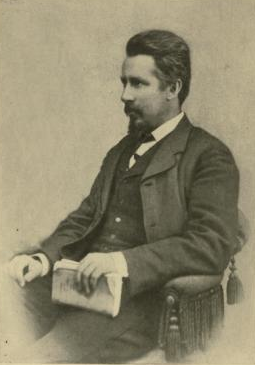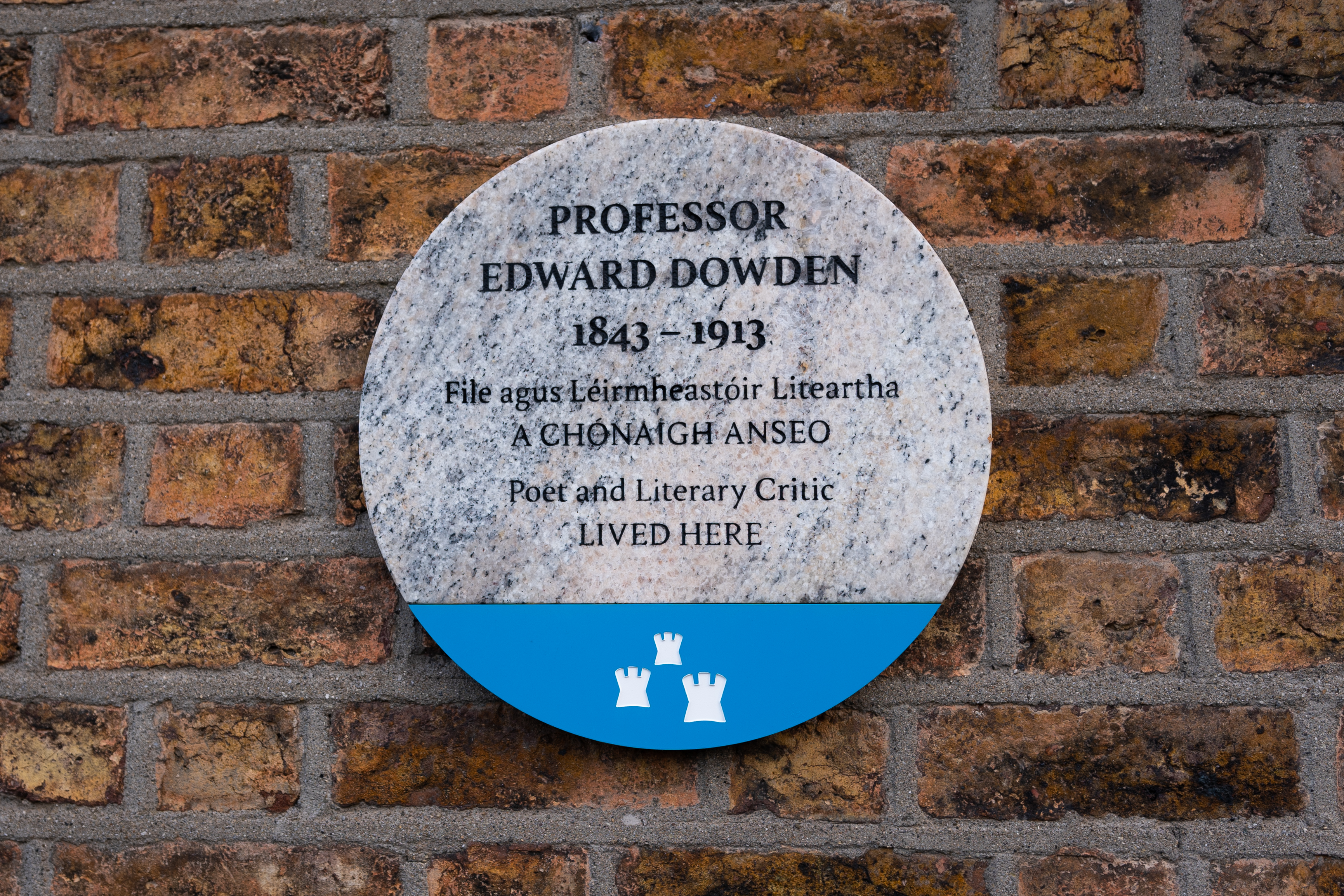Edward Dowden on:
[Wikipedia]
[Google]
[Amazon]
Edward Dowden (; 3 May 18434 April 1913) was an Irish
 Dowden's first book, ''Shakspere: A Critical Study of His Mind and Art'' (1875),Dowden 1875, ''Shakspere: A Critical Study of His Mind and Art'':
Dowden's first book, ''Shakspere: A Critical Study of His Mind and Art'' (1875),Dowden 1875, ''Shakspere: A Critical Study of His Mind and Art'':
Online edition
in HathiTrust Digital Library. resulted from a revision of a course of lectures, and made him widely known as a critic: translations appeared in German and Russian; his ''Poems'' (1876) went into a second edition. His ''Shakespeare Primer'' (1877) was translated into Italian and German. In 1878 the Royal Irish Academy awarded him the Cunningham gold medal "for his literary writings, especially in the field of Shakespearian criticism." Later works by him in this field included an edition of ''Sonnets of William Shakespere'' (1881), ''Passionate Pilgrim'' (1883), ''Introduction to Shakespeare'' (1893), ''Hamlet'' (1899), '' Edward Dowden died in Dublin. His ''Letters'' were published in 1914 by Elizabeth and Hilda Dowden.
Edward Dowden died in Dublin. His ''Letters'' were published in 1914 by Elizabeth and Hilda Dowden.
''In Defense of Harriet Shelley''
– comments on Dowden's ''Life of Shelley'' by Mark Twain * * *
Article in Cassell's ''Universal Portrait Gallery''
{{DEFAULTSORT:Dowden, Edward 1843 births 1913 deaths Writers from Cork (city) 19th-century Irish poets Alumni of Queens College Cork Alumni of Trinity College Dublin Shakespearean scholars Irish literary critics Academics of Trinity College Dublin Scholars and academics from Cork (city)
critic
A critic is a person who communicates an assessment and an opinion of various forms of creative works such as Art criticism, art, Literary criticism, literature, Music journalism, music, Film criticism, cinema, Theater criticism, theater, Fas ...
, professor
Professor (commonly abbreviated as Prof.) is an Academy, academic rank at university, universities and other tertiary education, post-secondary education and research institutions in most countries. Literally, ''professor'' derives from Latin ...
, and poet
A poet is a person who studies and creates poetry. Poets may describe themselves as such or be described as such by others. A poet may simply be the creator (thought, thinker, songwriter, writer, or author) who creates (composes) poems (oral t ...
.
Biography
He was the son of John Wheeler Dowden, a merchant and landowner, and was born at Cork, three years after his brother John, who became Bishop of Edinburgh in 1886. Edward's literary tastes emerged early, in a series of essays written at the age of twelve. His home education continued at Queen's College, Cork and at Trinity College, Dublin. He contributed to the literary magazine '' Kottabos.'' He had a distinguished career, becoming president of the Philosophical Society, and won the vice-chancellor's prize for English verse and prose, and the first senior moderatorship inethics
Ethics is the philosophy, philosophical study of Morality, moral phenomena. Also called moral philosophy, it investigates Normativity, normative questions about what people ought to do or which behavior is morally right. Its main branches inclu ...
and logic
Logic is the study of correct reasoning. It includes both formal and informal logic. Formal logic is the study of deductively valid inferences or logical truths. It examines how conclusions follow from premises based on the structure o ...
. In 1867 he was elected professor of oratory and English literature
English literature is literature written in the English language from the English-speaking world. The English language has developed over more than 1,400 years. The earliest forms of English, a set of Anglo-Frisian languages, Anglo-Frisian d ...
in Dublin University.
 Dowden's first book, ''Shakspere: A Critical Study of His Mind and Art'' (1875),Dowden 1875, ''Shakspere: A Critical Study of His Mind and Art'':
Dowden's first book, ''Shakspere: A Critical Study of His Mind and Art'' (1875),Dowden 1875, ''Shakspere: A Critical Study of His Mind and Art'': Online edition
in HathiTrust Digital Library. resulted from a revision of a course of lectures, and made him widely known as a critic: translations appeared in German and Russian; his ''Poems'' (1876) went into a second edition. His ''Shakespeare Primer'' (1877) was translated into Italian and German. In 1878 the Royal Irish Academy awarded him the Cunningham gold medal "for his literary writings, especially in the field of Shakespearian criticism." Later works by him in this field included an edition of ''Sonnets of William Shakespere'' (1881), ''Passionate Pilgrim'' (1883), ''Introduction to Shakespeare'' (1893), ''Hamlet'' (1899), ''
Romeo and Juliet
''The Tragedy of Romeo and Juliet'', often shortened to ''Romeo and Juliet'', is a Shakespearean tragedy, tragedy written by William Shakespeare about the romance between two young Italians from feuding families. It was among Shakespeare's ...
'' (1900), '' Cymbeline'' (1903), and an article entitled "Shakespeare as a Man of Science" (in the ''National Review'', July 1902), which criticized T. E. Webb's ''Mystery of William Shakespeare''. His critical essays "Studies in Literature" (1878), "Transcripts and Studies" (1888), "New Studies in Literature" (1895) showed a profound knowledge of the currents and tendencies of thought in various ages and countries; but his ''The Life of Percy Bysshe Shelley'' (1886) made him best known to the public at large. In 1900 he edited an edition of Shelley's works.
Other books by him which indicate his interests in literature include: '' Southey'' (in the " English Men of Letters" series, 1879), his edition of ''Southey's Correspondence with Caroline Bowles'' (1881), and ''Select Poems of Southey'' (1895), his Correspondence of Sir Henry Taylor (1888), his edition of Wordsworth's ''Poetical Works'' (1892) and of his ''Lyrical Ballads'' (1890), his ''French Revolution and English Literature'' (1897; lectures given at Princeton University
Princeton University is a private university, private Ivy League research university in Princeton, New Jersey, United States. Founded in 1746 in Elizabeth, New Jersey, Elizabeth as the College of New Jersey, Princeton is the List of Colonial ...
in 1896), ''History of French Literature'' (1897), ''Puritan and Anglican'' (1900), ''Robert Browning
Robert Browning (7 May 1812 – 12 December 1889) was an English poet and playwright whose dramatic monologues put him high among the Victorian literature, Victorian poets. He was noted for irony, characterization, dark humour, social commentar ...
'' (1904) and ''Michel de Montaigne
Michel Eyquem, Seigneur de Montaigne ( ; ; ; 28 February 1533 – 13 September 1592), commonly known as Michel de Montaigne, was one of the most significant philosophers of the French Renaissance. He is known for popularising the the essay ...
'' (1905). His devotion to Goethe
Johann Wolfgang (von) Goethe (28 August 1749 – 22 March 1832) was a German polymath who is widely regarded as the most influential writer in the German language. His work has had a wide-ranging influence on Western literature, literary, Polit ...
led to his succeeding Max Müller
Friedrich Max Müller (; 6 December 1823 – 28 October 1900) was a German-born British comparative philologist and oriental studies, Orientalist. He was one of the founders of the Western academic disciplines of Indology and religious s ...
in 1888 as president of the English Goethe Society.
In 1889 he gave the first annual Taylorian Lecture at the University of Oxford
The University of Oxford is a collegiate university, collegiate research university in Oxford, England. There is evidence of teaching as early as 1096, making it the oldest university in the English-speaking world and the List of oldest un ...
, and from 1892 to 1896 served as Clark lecturer at Trinity College, Cambridge
Trinity College is a Colleges of the University of Cambridge, constituent college of the University of Cambridge. Founded in 1546 by King Henry VIII, Trinity is one of the largest Cambridge colleges, with the largest financial endowment of any ...
. To his research are due, among other matters of literary interest, the first account of Thomas Carlyle
Thomas Carlyle (4 December 17955 February 1881) was a Scottish essayist, historian, and philosopher. Known as the "Sage writing, sage of Chelsea, London, Chelsea", his writings strongly influenced the intellectual and artistic culture of the V ...
's ''Lectures on periods of European culture''; the identification of Shelley as the author of a review (in ''The Critical Review'' of December 1814) of a romance by Thomas Jefferson Hogg; a description of Shelley's ''Philosophical View of Reform''; a manuscript diary of Fabre d'Églantine; and a record by Dr Wilhelm Weissenborn of Goethe's last days and death. He also discovered a ''Narrative of a Prisoner of War under Napoleon'' (published in '' Blackwood's Magazine''), an unknown pamphlet by Bishop Berkeley, some unpublished writings of William Hayley relating to Cowper, and a unique copy of the ''Tales of Terror''.
His wide interests and scholarly methods made his influence on criticism both sound and stimulating, and his own ideals are well described in his essay on ''The Interpretation of Literature'' in his ''Transcripts and Studies''. As commissioner of education in Ireland (1896–1901), trustee of the National Library of Ireland, secretary of the Irish Liberal Union and vice-president of the Irish Unionist Alliance, he enforced his view that literature should not be divorced from practical life. His biographical/critical concepts, particularly in connection with Shakespeare, are played with by Stephen Dedalus in the library chapter of James Joyce's ''Ulysses''. Leslie Fiedler was to play with them again in ''The Stranger in Shakespeare''.
Dowden married twice, first (1866) Mary Clerke, and secondly (1895) Elizabeth Dickinson West, daughter of the dean of St Patrick's. His daughter by his first wife, Hester Dowden, was a well-known spiritualist medium.
 Edward Dowden died in Dublin. His ''Letters'' were published in 1914 by Elizabeth and Hilda Dowden.
Edward Dowden died in Dublin. His ''Letters'' were published in 1914 by Elizabeth and Hilda Dowden.
References
* * Dowden, Edward. (1875). ''Shakespeare: A Critical Study of his Mind and Art''. Henry S. King & Co. (reissued byCambridge University Press
Cambridge University Press was the university press of the University of Cambridge. Granted a letters patent by King Henry VIII in 1534, it was the oldest university press in the world. Cambridge University Press merged with Cambridge Assessme ...
, 2009; )
Further reading
*William M. Murphy. "Prodigal Father: the Life of John Butler Yeats (1839–1922)" (Ithaca and London: Cornell University Press, 1978; paperback edition, 1979; revised paperback edition, Syracuse University Press, 2001.) *William M. Murphy, 'Yeats, Quinn, and Edward Dowden,' in "John Quinn: Selected Irish Writers from His Library," ed. Janis and Richard Londraville (Locust Hill Press, 2001).External links
* *''In Defense of Harriet Shelley''
– comments on Dowden's ''Life of Shelley'' by Mark Twain * * *
Article in Cassell's ''Universal Portrait Gallery''
{{DEFAULTSORT:Dowden, Edward 1843 births 1913 deaths Writers from Cork (city) 19th-century Irish poets Alumni of Queens College Cork Alumni of Trinity College Dublin Shakespearean scholars Irish literary critics Academics of Trinity College Dublin Scholars and academics from Cork (city)